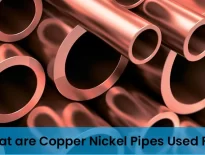Alloy steel pipes are an essential component in various industries due to their strength, durability, and ability to with stand high pressures and extreme conditions. This guide provides an in-depth look into alloy steel pipes, their benefits, applications, and the types of steel pipes available in the market. If you’re exploring options for alloy pipes for your projects, this guide will help you make an informed decision.
At Solitaire Overseas, we specialize in providing high-quality alloy steel pipes tailored to your specific needs. Our pipes are designed to withstand the toughest conditions, ensuring durability, efficiency, and cost-effectiveness for your projects.
What is an Alloy Steel Pipe?
An alloy steel pipe is made from a combination of steel and other elements such as chromium, nickel, molybdenum, and vanadium. These additional elements enhance the mechanical properties of the pipe, such as strength, corrosion resistance, and heat resistance. The composition of the alloy determines the steel pipe grades and their suitability for specific applications.
Types of Alloy Steel Pipes
Alloy steel pipes come in various types and configurations to cater to diverse industrial requirements. Here are some of the most common types of steel pipes:
- Low-Alloy Steel Pipes
- Contain a small percentage of alloying elements (typically less than 5%)
- Offer moderate strength and corrosion resistance
- Commonly used in construction and structural applications
- High-Alloy Steel Pipes
- Have a higher percentage of alloying elements (more than 5%)
- Provide exceptional heat and corrosion resistance
- Ideal for use in power plants, chemical processing, and high-temperature environments
- Seamless Alloy Pipes
- Manufactured without a weld seam, providing greater strength and durability
- Suitable for applications requiring high-pressure and temperature resistance
- Welded Alloy Pipes
- Created by welding sections of pipe together
- Cost-effective and used in low-pressure environments
- Heat-Resistant Alloy Pipes
- Designed to withstand extreme temperatures
- Used in furnaces, boilers, and other high-heat applications
Steel Pipe Grades
Steel pipe grades indicate the quality and mechanical properties of the pipe. Some popular grades for alloy steel pipes include:
- P1, P2, P5, P9: Used in high-temperature and pressure applications
- T11, T22: Common in power generation and chemical processing industries
- P91: Known for its strength and durability, often used in power plants
The choice of steel pipe grade depends on the specific requirements of your project, such as temperature, pressure, and corrosion resistance.
Benefits of Using Alloy Pipes
- High Strength and Durability
- Alloy pipes are stronger and more durable than carbon steel pipes, making them ideal for demanding applications.
- Corrosion Resistance
- The addition of elements like chromium and nickel improves the pipe’s resistance to rust and corrosion.
- Heat Resistance
- Alloy steel pipes can withstand extreme temperatures, making them suitable for high-heat environments.
- Versatility
- Available in various steel pipe types and grades, alloy pipes can be customized for specific industrial needs.
- Cost-Effective
- Due to their long lifespan and low maintenance requirements, alloy steel pipes offer excellent value for money.
Applications of Alloy Steel Pipes
Alloy pipes are widely used across several industries, including:
- Oil and Gas: For transporting crude oil, natural gas, and other petroleum products
- Power Plants: In boilers, heat exchangers, and turbines
- Chemical Processing: For handling corrosive chemicals and high-pressure processes
- Construction: As structural components in buildings, bridges, and infrastructure
- Automotive and Aerospace: In exhaust systems and other high-performance applications
Choosing the Right Alloy Steel Pipe for Your Project
When selecting an alloy pipe, consider the following factors:
- Application Requirements
- Determine the pressure, temperature, and environmental conditions the pipe will face.
- Steel Pipe Grades
- Choose the appropriate grade based on the mechanical and chemical properties needed.
- Type of Alloy Pipe
- Decide between seamless, welded, or heat-resistant options based on your application.
- Cost and Availability
- Compare pricing and ensure the supplier can meet your project’s timeline and specifications.
Why Choose Alloy Pipes Over Other Materials?
While there are many types of steel pipes, alloy steel pipes stand out due to their superior mechanical properties and adaptability. Compared to other materials, alloy pipes offer a better balance of strength, resistance, and cost-effectiveness, making them the preferred choice for high-performance applications.
Conclusion
Alloy steel pipes are a strong and reliable choice for many industries. They can withstand tough conditions and last a long time. To get the right pipe for your project, you need to know about the different types of steel pipes, their grades, and the benefits of alloy pipes. Whether you’re working on a construction, power generation, or chemical processing project, choosing the right alloy steel pipe is crucial for durability, efficiency, and cost-effectiveness. For top-quality alloy steel pipes made to your specifications, rely on Solitaire Overseas, a trusted industry leader with a proven track record.


